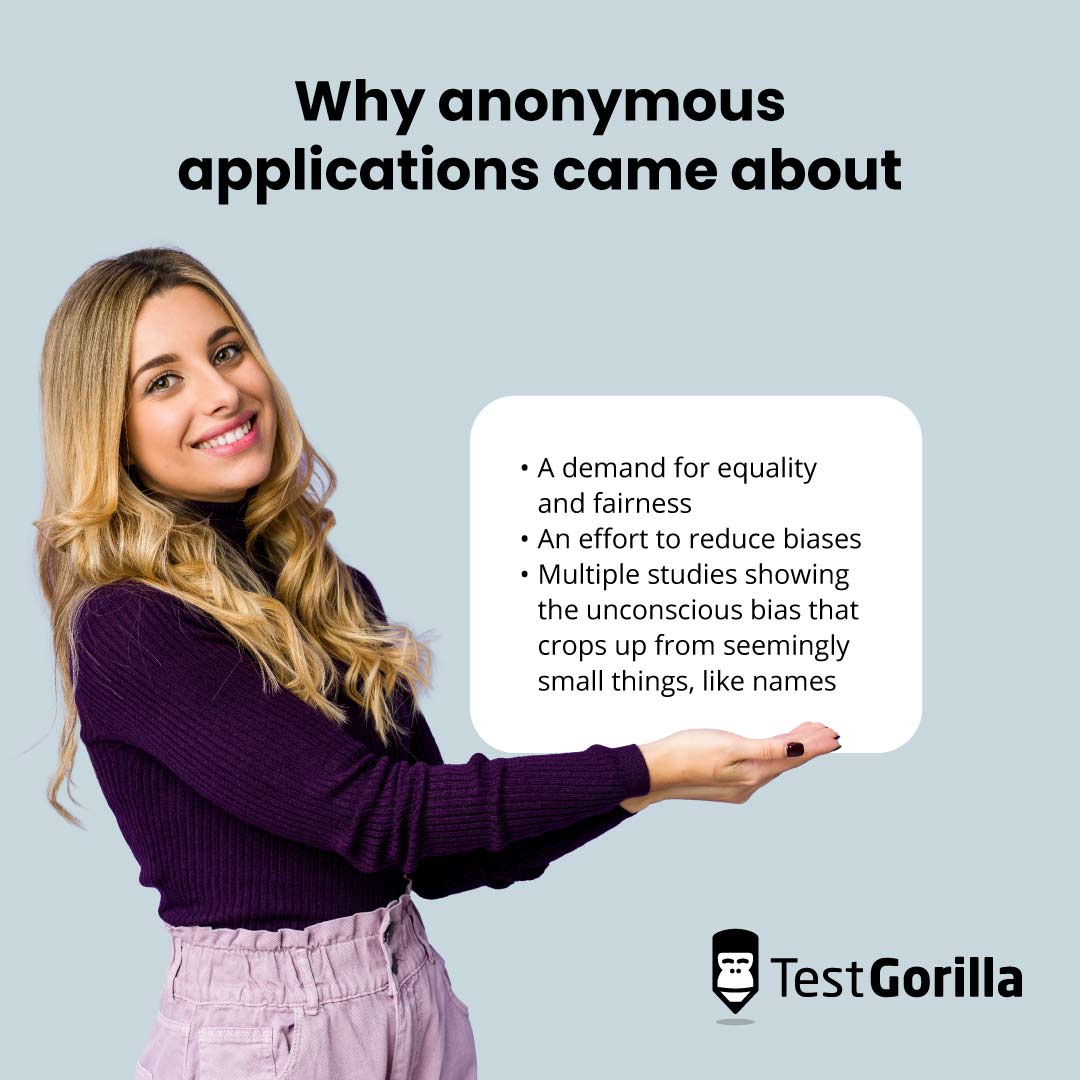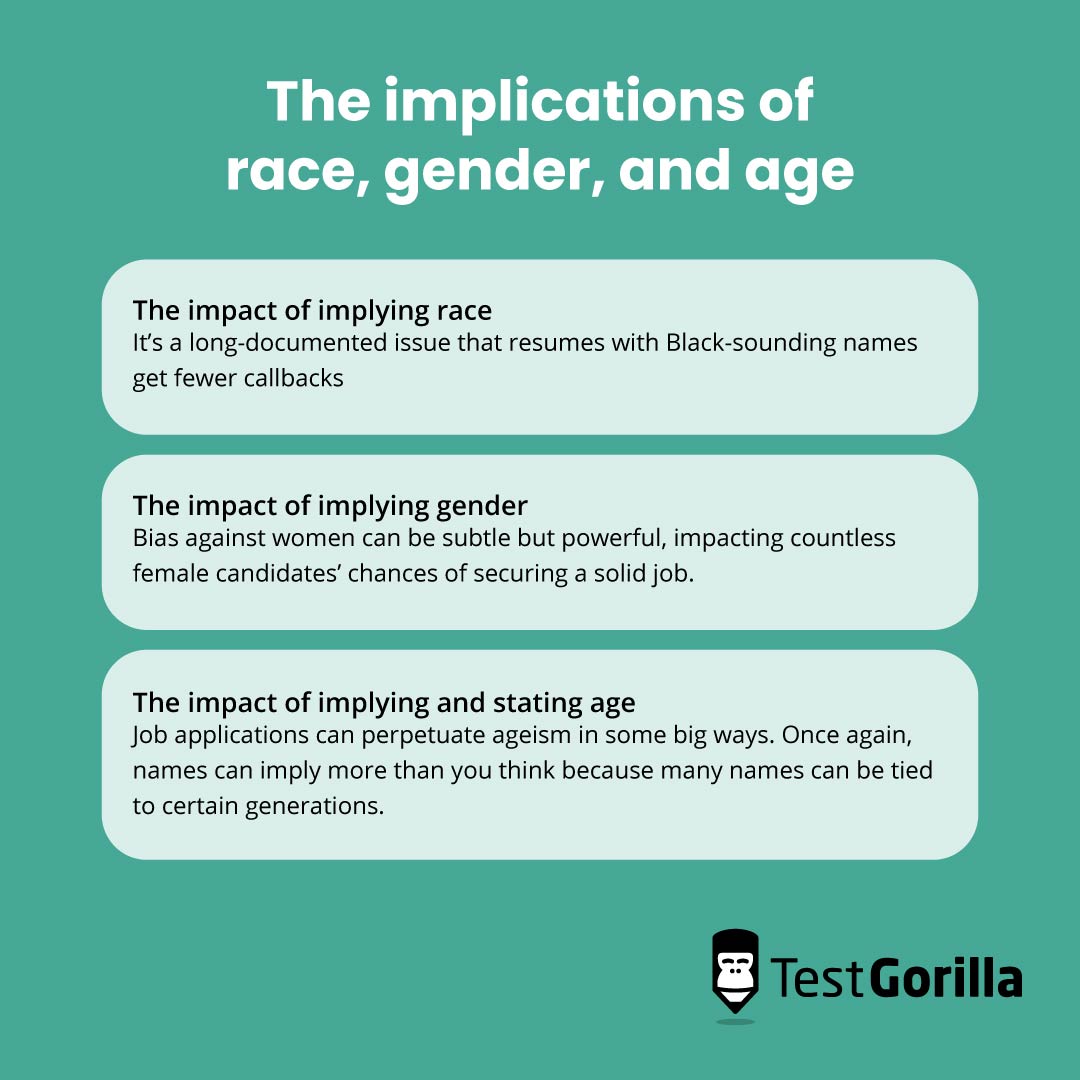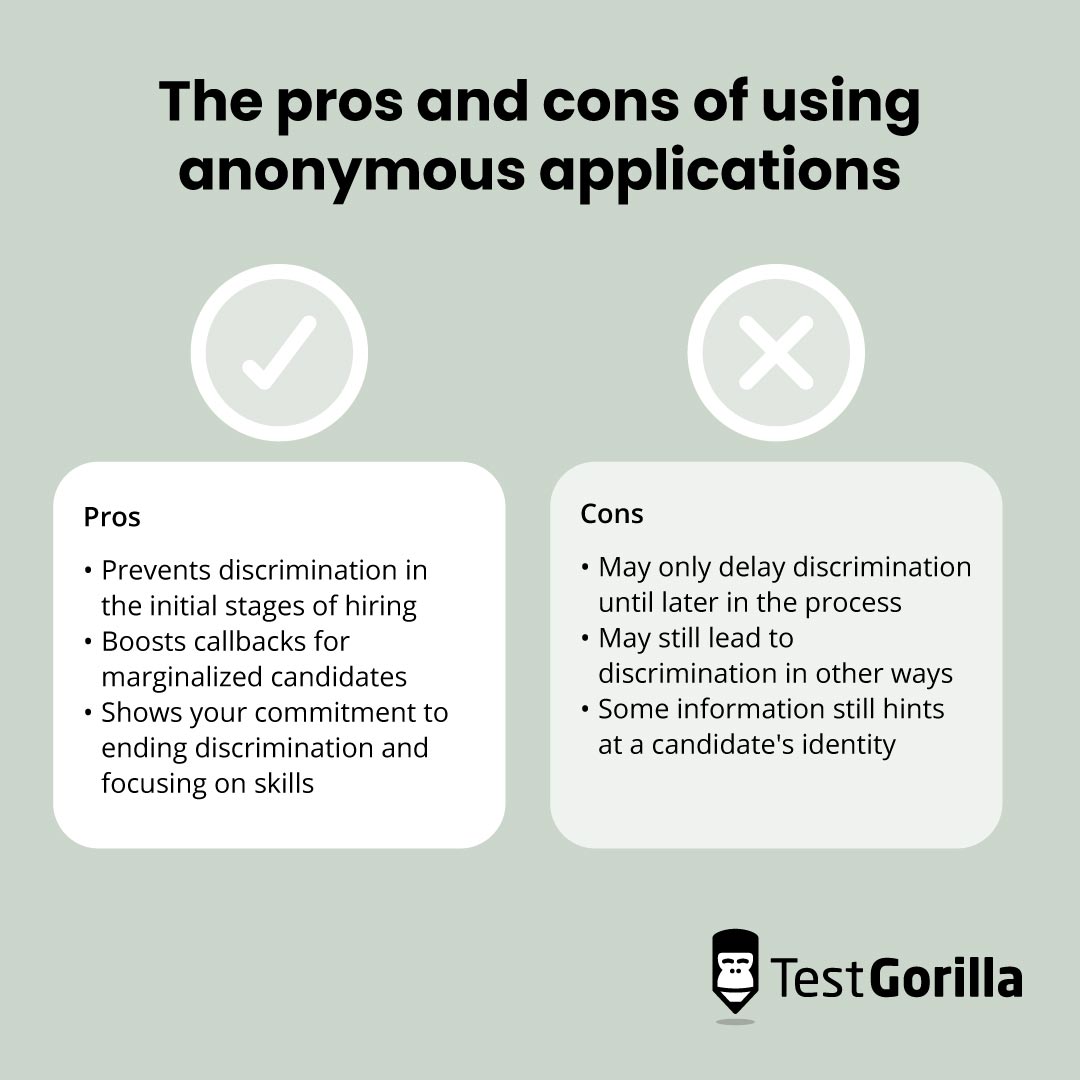A job application is a pretty standard form to fill out.
They’re a way to quickly list out achievements, skills, and competencies – and an equally quick way to tell employers your name, age, gender, and race.
If this sounds like an opportunity to open the door to unconscious bias to you, you’re right.
Anonymous job applications sidestep this issue by removing certain personal details from the process, instead focusing on whether or not the candidate has the right skills, like solid computer literacy.
The question is, does anonymous hiring fit into a part of a skills-based hiring approach? They certainly fall under a similar umbrella because they aim to reduce discrimination and promote equality.
But they do have a few disadvantages.
Let’s dive into a critical analysis of anonymous hiring. We’ll discuss the pros and cons of using them, what they aim to accomplish, and the better solution to discrimination: skills-based hiring.
Table of contents
What is anonymous?
In an anonymous hiring approach, candidates omit certain information, such as name, gender, birth date, and graduation date, from their job applications.
Anonymous applications are generally thought well of, although opinions differ from one HR professional to another.
They came about for a handful of reasons:
A demand for equality and fairness
An effort to reduce biases
Multiple studies show the unconscious bias that crops up from seemingly small things, like names
These applications are generally part of a blind hiring process. Many companies started using a blind hiring process in an effort to combat damaging biases and improve fairness in hiring.
Does anonymous hiring impact racial, gender, and age-based bias?
You might be thinking:
“What’s so bad about listing a candidate’s name and age?”
A lot of implications come from something as simple as a name. For example, the name “Ashley” is used for both men and women, but most hiring managers immediately assume the applicant is a woman.
And, unfortunately, unconscious biases stack up from there.
One study showed applicants with feminine-sounding names needed enough experience to be considered “overqualified” to be hired, while male applicants needed the average amount of experience to be hired for the same position.[1]
This unconscious bias is harmful and stifles gender and race diversity, as well as generational diversity.
It’s important to note that everyone can have unconscious bias, no matter how forward-thinking they are or how good their intentions are.
Unconscious bias is so powerful it can even affect unexpected demographics. A good example is this Reddit user, who conducted his own small experiment after being told he has a unique name.
For anonymity, he doesn’t specifically list his name. But he says his first name is Indonesian and “sounds feminine,” and his last name is Lee.
The user submitted job applications with both his real name and the name “Conor Miller.” He was shocked to find the latter, which sounds much more White and masculine, got many more callbacks.
And this person is a White male.
Implying gender, age, and race on applications has a powerful impact. It’s much the same as implying these factors through a resume.
Let’s take a closer look at how the implications of race, gender, and age can have damaging side effects for job seekers.
The impact of implying race
It’s a long-documented issue that resumes with Black-sounding names get fewer callbacks.
The first study reporting on this topic was created in 2003, but in that time we haven’t improved much.[2]
A 2021 study found race discrimination is still a major problem. This study showed that applicants with Black-sounding names, such as “Lakisha” and “Jamal,” received 10% fewer callbacks than applicants with names like “Emily” and “Greg.”
Eliminating this bias is not only the right thing to do – it’s also essential for your diversity initiatives and cross-cultural recruitment efforts.
The impact of implying gender
Bias against women can be subtle but powerful, impacting countless female candidates’ chances of securing a solid job.
Much the same as race, it’s documented that removing names or changing a woman’s name to a masculine name improves the response rate for female candidates.
This Reddit post shows what many women have to go through to get callbacks from companies.
According to the user, when she uses a “masculine nickname” formed from her real name to apply for jobs, she sees a clear increase in callbacks. Women shouldn’t have to pretend to be men to get a job.
A study by HBR found successful job applications for women rose from 18% to 30% when anonymized.
The impact of implying and stating age
Job applications can perpetuate ageism in some big ways.
Once again, names can imply more than you think because many names can be tied to certain generations.
Unique names such as Lyric, Granite, and Nebula can be tied not only to younger generations but also to LGBTQ+ identity. It’s even a common joke that modern “kids” have silly names.
Many applications also ask for a date of birth and graduation date, which immediately informs an employer of age and generation.
A recent study by AARP discovered some startling statistics:[3]
53% of job seekers were asked to provide their date of birth on a job application
47% of job seekers were asked to provide their graduation date on a job application
15% of job seekers have been passed over for a role due to their age
For more insights on ageism in the workplace, check out our blog on age discrimination.
The pros and cons of using anonymous hiring
Let’s take a look at both the good and the bad of using anonymous applications.
Here’s a quick summary:
Pros | Cons |
- Prevents discrimination in the initial stages of hiring. - Boosts callbacks for marginalized candidates. - Shows your commitment to ending discrimination and focusing on skills | - May only delay discrimination until later in the process. - May still lead to discrimination in other ways. - Some information still hints at a candidate’s identity |
The benefits of using anonymous hiring
First, let’s start with the pros.
1. Prevents discrimination in the initial stages of hiring
Anonymous applications omit information like name and age, decreasing the chance of discrimination in the early stages of hiring.
This helps more top talent break through the initial stages.
Many of the issues related to gender and race discrimination happen in the early stages, and increasing the odds of a candidate making it to the next stage gives them a better shot at displaying their capabilities and securing the job.
2. Boosts callbacks for marginalized candidates
Anonymous applications reduce bias in the application stage, lessening the chance of bias against marginalized candidates.
Marginalized applicants don’t need to change their names to increase their chances of getting a callback, unlike the examples we covered earlier of using masculine nicknames or traditionally White names.
Because of reduced discrimination, anonymous applications lead to a more diverse candidate pool in the interview stage. This also benefits the hiring manager because qualified candidates weren’t discounted unfairly during the initial stage of hiring.
3. Shows your commitment to ending discrimination and focusing on skills
Anonymous applications are an excellent way to show your values.
They let candidates know you are committed to ending discrimination, focusing on skills, and providing an equal opportunity for all.
This is great for your brand image and communicating your culture.
However, there are other ways to show your commitment to equality and hiring for skills, such as adopting skills-based hiring (more on that later).
The disadvantages of anonymous hiring
Now, let’s cover the cons.
1. May only delay discrimination until later in the process
Anonymous applications reduce the chance for bias, but they may only delay the inevitable.
One example is our own Dawn Gilfillan, one of our SEO content writers. Before she joined us, she had trouble finding a job due to her age.
She eventually stopped listing her age on her resume and immediately got more callbacks. But she ultimately still had to show employers her age when she came in for the interview, where they then rejected her.
To read Dawn’s story and many more, read our 10 stories that demonstrate the power of skills-based hiring.
2. May still lead to discrimination in other ways
Even if an application doesn’t have implications of gender, race, or age, other factors could lead to discrimination.
For example, some minority groups have lower instances of four-year degrees. According to one study, four-year degree requirements automatically screen out 83% of Hispanic candidates and 76% of African American candidates.
And due to degree inflation, countless hiring managers discount any candidate without a four-year degree.
This issue is most prevalent in a hiring process that is largely unchanged (i.e. traditional) and simply has anonymous applications tacked on.
3. Some information still hints at a candidate’s identity
Although anonymous applications remove name and age, other factors could still hint at an individual’s identity.
Here are a few examples:
Certain gaps in work history could be maternity leave, telling the employer that the candidate is a woman
Fluency in foreign languages could signal an immigrant background
Large amounts of charity work for LGBTQ+ organizations could hint that the candidate is LGBTQ+
Even something that subtle can create unconscious bias, and the only way to significantly reduce bias is to focus on skills and skills alone.
How to create anonymous job applications
How do you create anonymous applications? What’s on them, and what’s not on them?
The most crucial points to be mindful of are name, age, education, and implications of gender and ethnic background.
It’s also important to be careful asking for personal interests. This can be easily linked to “cultural fit,” like the employer who infamously only hired fellow lacrosse players.[4]
“Culture add” is a new practice of hiring candidates whose values align with your organization’s, but you still respect and prize their diversity. For more insights, read our blog on culture add vs culture fit. Here’s a clear summary of the do’s and don’ts of anonymous applications:
Include:
Skills
Competencies
Accomplishments and achievements (such as “helped a former company rank #1 on SERP”)
Experience or experience equivalent (explained experience rather than years of experience)
Contact information
Availability
Additional notes or information
Don't Include:
Gender
Birthdate
Graduation date
Criminal history (related to fair-chance hiring practices)
Previous employers
Education
A good example of anonymous applications in action is the Metsa Group.
The Metsa Group wants to stress its commitment to diversity and equality, so it proudly shows its anonymous recruitment practices.
It omits date of birth, gender, mother tongue, and certain other factors from the recruiting process.
The Metsa Group wants to prioritize applications based on skills and competencies. Companies like them are certainly on the right side of history, but there’s a better way.
How do anonymous applications fit into skills-based practices and the future of hiring?
So are anonymous applications necessary for a fair hiring process?
No, they’re not. Much like resumes, they’re outdated, and a recruiting process with them still has the opportunity for bias.
Traditional applications, anonymous or not, let too much get in the way of what matters most: skills.
Ulf Rinne, the head of scientific management at IZA, has studied anonymous applications in depth and has said some enlightening things about them.[5]
Ulf says that these applications have the potential to remove some discriminatory hiring barriers for certain applicants, and when implemented effectively, they level the playing field by shifting the focus toward skills and capabilities.
He adds, “Anonymous job applications should not, however, be regarded as a universal remedy that is applicable in any context or that can prevent any form of discrimination.”
In other words, because they help refocus our lens on skills and competencies, they’re helpful – but they aren’t going to create the perfect process on their own.
The best way to reduce bias and increase diversity is by focusing on skills.
According to TestGorilla’s State of Skills-Based Hiring 2022 report, 76% of businesses used skills-based hiring practices and 80% of organizations had a goal to increase diversity.
And 91.1% of companies increased diversity using skills-based hiring.
Skills-based hiring eliminates nearly every opportunity for bias and instead focuses on capabilities. Candidates complete assessments in place of applications, and you simply evaluate those instead of sorting applications.
Skills tests assess what matters: whether or not you can do the job, not your name or age.
Humans naturally have biases, but we’re also the only thing that can prevent them. There are too many harmful biases that come from AI, and if we rely on them exclusively, it can hurt our hiring processes.[6]
To read more about this, check out our post on can skills-based tests be biased?
But, as humans, simply being aware of our potential biases is a strong deterrent. Combining our own knowledge and mindfulness with skills-based hiring can create an effective, inclusive hiring process.
Focus on what matters with skills tests
Anonymous applications are a step in the right direction – an attempt to reduce bias, draw attention away from names and age, and focus on the qualities that make a good candidate.
But they aren’t perfect.
The best way to reduce bias and hire the ideal candidate is through skills-based hiring. Skills tests show whether the candidate can complete the responsibilities, with no weight given to their race, gender, or age.
For the next step, check out our article on how to prepare job descriptions for a skills-based hiring approach.
To check out more than 300 pre-employment tests, browse our test library.
Sources
Campbell, Elizabeth; Hahl, Lauren. (January 20, 2022). “He’s Overqualified, She’s Highly Committed: Qualification Signals and Gendered Assumptions About Job Candidate Commitment”. Organization Science. Retrieved May 16, 2023.
Leonard, Bill. (February 1, 2003). “Study Suggests Bias Against ‘Black’ Names On Resumes”. SHRM. Retrieved May 16, 2023. https://www.shrm.org/hr-today/news/hr-magazine/pages/0203hrnews2.aspx
Choi-Allum, Lona. (July 2022). “Age Discrimination Among Workers Age 50-Plus”. AARP. Retrieved May 16, 2023. https://www.aarp.org/research/topics/economics/info-2022/workforce-trends-older-adults-age-discrimination.html
Epstein, Sophia. (October 20, 2021). “What does being a ‘cultural fit’ actually mean?”. BBC Worklife. Retrieved May 16, 2023. https://www.bbc.com/worklife/article/20211015-what-does-being-a-cultural-fit-actually-mean
Rinne, Ulf. (October 2018). “Anonymous job applications and hiring discrimination”. IZA World of Labor. Retrieved May 16, 2023. https://wol.iza.org/articles/anonymous-job-applications-and-hiring-discrimination/long
Manyika, James; Silberg, Jake; Presten, Brittany. (October 25, 2019). “What Do We Do About the Biases in AI?”. Harvard Business Review. Retrieved May 16, 2023. https://hbr.org/2019/10/what-do-we-do-about-the-biases-in-ai
Related posts
Hire the best candidates with TestGorilla
Create pre-employment assessments in minutes to screen candidates, save time, and hire the best talent.
Latest posts
The best advice in pre-employment testing, in your inbox.
No spam. Unsubscribe at any time.

Hire the best. No bias. No stress.
Our screening tests identify the best candidates and make your hiring decisions faster, easier, and bias-free.
Free resources
This checklist covers key features you should look for when choosing a skills testing platform
This resource will help you develop an onboarding checklist for new hires.
How to assess your candidates' attention to detail.
Learn how to get human resources certified through HRCI or SHRM.
Learn how you can improve the level of talent at your company.
Learn how CapitalT reduced hiring bias with online skills assessments.
Learn how to make the resume process more efficient and more effective.
Improve your hiring strategy with these 7 critical recruitment metrics.
Learn how Sukhi decreased time spent reviewing resumes by 83%!
Hire more efficiently with these hacks that 99% of recruiters aren't using.
Make a business case for diversity and inclusion initiatives with this data.






















